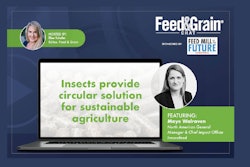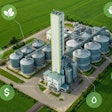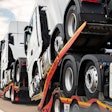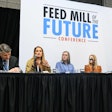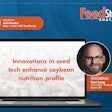
Food and beverage giant PepsiCo’s research reveals that consumers want it all when it comes to sustainability, according to Dan Christenson, PepsiCo’s senior director, government affairs. Elaborating on what “it all” means for PepsiCo customers, Christenson cited food ingredients grown with regenerative ag practices, environmentally friendly packaging and deliveries made by zero-emissions vehicles.
Speaking at the National Grain and Feed Association’s 128th Annual Convention, Christenson said these wants represent great opportunities for agriculture as he shared PepsiCo’s strategy to strengthen relationships with producers — the first mile of its supply chain — as well as with midstream suppliers (grain processors and ingredient producers) to leverage the shared benefits of these opportunities.
With about 60% of PepsiCo’s business revenue coming from food brands including Lay's, Doritos, Cheetos and Fritos, it has a massive reach into the agricultural supply chain. PepsiCo is one of the nation’s leading users of corn, potatoes, sugar (derived from beets and cane), and wheat, and controls much of their supply chain to optimize product value. It also purchases commodities and ingredients, such as oils, corn meal and corn syrup, from partners including ADM, Cargill and Bunge.
PepsiCo delivers product to the last mile of the supply chain using its own fleet of 80,000 route trucks — the largest privately held and operated truck fleet in North America. Christenson highlighted PepsiCo’s expansion of clean transportation fuel projects as a key opportunity for soybean producers, as transportation represents a significant portion of PepsiCo’s Scope 1, or direct operations, emissions. For PepsiCo to reach its goal to be carbon neutral by 2040, Christenson said an “all of the above” approach is key, especially in the transportation sector.
The company made headlines in 2022 when it announced a pilot program using Tesla all-electric semitractor-trailers to identify any operational challenges that could come from replacing diesel-powered trucks with battery-powered trucks. The pilot project now operates 21 all-electric tractor-trailers, located in Sacramento, California.
“PepsiCo was the first company to buy electric tractor-trailers, and while that work is important, when you think about an 80,000-asset fleet, we can't overindex on any one strategy,” Christenson said. “Now, on the coasts, where we have a more developed grid and policy forces that are pushing towards this shift, you will see a lot more electrification.”
But Christenson highlighted another pilot project taking place in Kansas, using novel technology to enable diesel-powered tractor-trailers to run on low-carbon, clean renewable fuel grown from soybeans. Starting with 10 vehicles out of a Topeka Frito-Lay manufacturing plant, PepsiCo initiated the project to test the performance of B100 (100% biodiesel) in over-the-road operations, particularly in rural areas where decarbonization is a challenge due to lacking electrification infrastructure.
To convert B100 into fuel that conventional diesel engines can use, the vehicles employ a technology called the Vector System, provided by Optimus Technologies. This conversion system offers a cost-effective solution for fleet decarbonization without any operations disruption, as engines can run on traditional diesel or renewable diesel when necessary.
Christenson said PepsiCo had the opportunity to compare fleet operations of each fuel option side by side under harsh weather conditions in January.
“Topeka was not chosen at random as the site to launch this pilot,” Christenson said. “We wanted to test this in cold weather, and during a major cold snap. We saw the performance for the B100 tractor-trailers was better than our conventional diesel trailers — zero downtime.”
The success of the pilot project led to the expansion of the program, and now 26 trucks operate on B100 year-round in Topeka. PepsiCo is extending the program to a Beloit, Wisconsin, Frito-Lay plant next, and plans to add up to 200 trucks that run on B100 throughout 2024.
Christenson said projects like this contribute to strengthening PepsiCo’s ties with the first mile of its supply chain while paving the way toward a carbon-neutral future.
“When we talk to soybean farmers and our mid-stream partners in the Midwest, where this work is being done, they can see it’s incredibly valuable to them.” Christenson said.
Various fleets, including municipalities and commercial organizations such as PepsiCo, are adopting this technology to economically reduce emissions and begin reaping the benefits of operating fleets on B100.
Recognizing the importance of sustainability to consumers and the necessity of innovation in agriculture is critical to the sustained success of grain and feed businesses. PepsiCo's investment in clean fuels projects across the Midwest brings solutions like the Vector System closer in reach for rurally based agribusinesses seeking to reduce their transportation emissions. Looking to consumer-facing brands in tune with evolving preferences and trends can offer valuable insights into innovations that could benefit feed and food manufacturing operations in the future.





